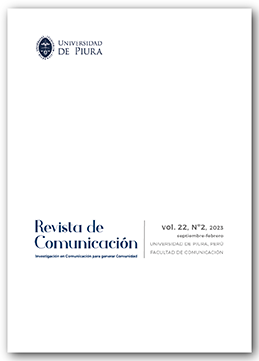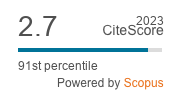Audiovisual content viewing practices and the psychosocial sentiment of political efficacy in younger audiences from Spain and México
DOI:
https://doi.org/10.26441/RC22.2-2023-3145Keywords:
television, streaming, political sociology, entertainment, media content, social mediaAbstract
Millennials and centennials are two generations highly involved with social issues at a political and technological level. This interest has been raised in many of these individuals, some members of «woke» communities, a search for politically correct language both in networks and contemporary audiovisual fiction usually consumed on streaming platforms. This study aimed to analyze the psychosocial feeling of political efficacy millennials and centennials have as streaming platform users in Spain and Mexico to determine their predisposition and justification to prioritize their points of view in the face of content censorship and cancellation. The results reveal that centennials have a greater sense of efficacy than millennials, the latter being the most concerned about censorship and freedom of expression when receiving a story.
Metrics
References
Aguilar-Barojas, S. (2005). Fórmulas para el cálculo de la muestra en investigaciones de salud. Salud en Tabasco, 11 (1-2). https://bit.ly/3uVpMKo
Barlovento Comunicación. (21 de diciembre de 2021). 4º ola. Barómetro TV-OTT. TV de pago y OTTS. Barloventocomunicación.es. https://bit.ly/3IV4eCS
Bene, M. (2020). Does context matter? A cross-country investigation of the effects of the media context on external and internal political efficacy. International Journal of Comparative Sociology, 61(4), 264–286. https://doi.org/10.1177/0020715220930065 DOI: https://doi.org/10.1177/0020715220930065
Bernardi, L., Mattila, M., Papageorgiou, A. & Rapeli, L. (2022), Down But Not Yet Out: Depression, Political Efficacy, and Voting. Political Psychology, 1-34. https://doi.org/10.1111/pops.12837 DOI: https://doi.org/10.1111/pops.12837
Black Lives Matter. (2015). About Black Lives Matter. Blacklivesmatter.com. https://bit.ly/3Qq0KwJ
Burgos, E. & Hernández Díaz, G. (2021). La cultura de la cancelación: ¿autoritarismo de las comunidades de usuario?. Comunicación: estudios venezolanos de comunicación, 193, 143-155.
Cabrera García-Ochoa, Y. (2019). Hábitos de uso y consumo de la generación millennial en sus teléfonos móviles. AdComunica, 21-40. https://doi.org/10.6035/2174- 0992.2019.18.3 DOI: https://doi.org/10.6035/2174-0992.2019.18.3
Cammaerts, B. (2022). The abnormalisation of social justice: The 'anti-woke culture war' discourse in the UK Discourse & Society. 1-14. https://doi.org/10.1177/09579265221095407 DOI: https://doi.org/10.1177/09579265221095407
Campbell, A., Gurin, G., & Miller, W. E. (1954). The voter decides. Evanston.
Candón-Mena, J. & Montero-Sánchez, D. (2021). From Cyber-Activism to Technopolitics: A Critical Take on Historical Periods and Orientations in the Use of Digital Technology by Social Movements. International Journal Of Communication, 15, 2921–2941. https://ijoc.org/index.php/ijoc/article/view/15221
Casal, J. & Mateu, E. (2003). Tipos de muestreo. Revista de epidemiología y medicina preventiva, 1, 3-7. https://bit.ly/379DT6x
Chevalier Naranjo, S. (16 de septiembre de 2020). El auge de las plataformas de streaming en América Latina. estatista.com. https://bit.ly/3ryTQuZ
Dimock, M. (2009). Defining generations: Where Millennials end and Generation Z begins. Pew Research Center. https://pewrsr.ch/36BlgID
Dirksmeier, P & Tuitjer, L. (2022). Do trust and renewable energy use enhance perceived climate change efficacy in Europe?. Environ Dev Sustain. https://doi.org/10.1007/s10668-022-02421-4 DOI: https://doi.org/10.1007/s10668-022-02421-4
Donohue-Dioh, J., Wilson, J. y Nicole, S. (2021). The Woke Disrupter: A Call to Action. Advances in social work, 21 (2/3), 1045-1063. https://doi.org/10.18060/24164 DOI: https://doi.org/10.18060/24164
El mundo. (5 de diciembre de 2012). El tribunal de Apelación confirma que 'Tintín en el Congo' no es racista. Elmundo.es. bit.ly/3CTdgiY
Fernández-Rodríguez, C. & Romero-Rodríguez, L.M. (2021). Cine de la crueldad y cultura mainstream contemporánea: La pornografía del horror en la tercera edad dorada de la televisión a través del caso de las series Years and Years y Chernobyl. Sindéresis.
Fernández-Rodríguez, C. & Castillo-Abdul, B. (2022). Censura y humillación artística por motivos ideológicos: Aproximación a la corrección política, wokismo y cultura de la cancelación en Occidente. In: Libro de Comunicaciones: VIII Congreso Internacional AE-IC. (pp.485-504). Asociación Española de Investigación de la Comunicación (AE-IC).
Fuenmayor, V. & García Aranguren, E. (2018). Los millennials y su reflejo en pantalla. Comunicación. Estudios venezolanos de comunicación, (183-184), 59-65. https://bit.ly/2QsPcP2
Galán, E. (2020). El síndrome Woody Allen: Por qué Woody Allen ha pasado de ser inocente a culpable en diez años. Debate.
Hernández Sampieri. R., Fernández Collado, C. & Baptista Lucio, P. (2014). Metodología de la investigación. McGraw Hill.
IAB México (9 de junio de 2017). Millennials: Estudio de consumo de medios entre internautas y mexicanos 2017. Iabmexico.com. https://bit.ly/3NJxz6D
INE. (1 de julio de 2021). Cifras de Población, Ambos sexos, Edad, Total Nacional, 1 de julio de 2021. Ine.es. https://bit.ly/3xaMwIO
INEGI. (2020). Censo de Población y vivienda. Inegi.org.mx. https://bit.ly/3LOF2zn
Kahne, J., & Westheimer, J. (2006). The Limits of Political Efficacy: Educating Citizens for a Democratic Society. PS: Political Science & Politics, 39(2), 289-296. doi:10.1017/S1049096506060471 DOI: https://doi.org/10.1017/S1049096506060471
Kenski. K & Jomini, N. (2006). Connections Between Internet Use and Political Efficacy, Knowledge, and Participation. Journal of Broadcasting & Electronic Media, 50(2), 173-19. http://dx.doi.org/10.1207/s15506878jobem5002_1 DOI: https://doi.org/10.1207/s15506878jobem5002_1
Klesner, J. (2003). Political attitudes, social capital, and political participation: The United States and Mexico compared. Estudios Mexicanos, 19(1), 29-63. https://doi.org/10.1525/msem.2003.19.1.29 DOI: https://doi.org/10.1525/msem.2003.19.1.29
Laicock, R. (28 de julio de 2021). Estadísticas de streaming en España. Finder.com. https://bit.ly/35MulOe
Marirrodriga, J. (2017). Más Platón y menos Dora, la exploradora. El país. https://bit.ly/3ucr2s3
Morán, P. (4 de febrero de 2022). "Maus" y la censura en el cómic. La ser. https://bit.ly/3CWSNsv
Morrell, M. (2003). Survey and Experimental Evidence for a Reliable and Valid Measure of Internal Political Efficacy. Public Opinion Quarterly, 67 (4), 589–602. https://doi.org/10.1086/378965 DOI: https://doi.org/10.1086/378965
Mueller, T. (2021). Blame, then shame? Psychological predictors in cancel culture behavior. The Social Science Journal. https://doi.org/10.1080/03623319.2021.1949552 DOI: https://doi.org/10.1080/03623319.2021.1949552
Muñoz-Rojas, O. (2021). El desafío del ‘pensamiento woke’. En El país. https://bit.ly/3CUl6H3
Ng, E. (2020). No Grand Pronouncements Here...: Reflections on Cancel Culture and Digital Media Participation. Television & New Media, 21, 621 - 627. https://doi.org/10.1177/1527476420918828 DOI: https://doi.org/10.1177/1527476420918828
Niemi, R. G., Craig, S. C., & Mattei, F. (1991). Measuring Internal Political Efficacy in the 1988 National Election Study. The American Political Science Review, 85(4), 1407–1413. https://doi.org/10.2307/1963953 DOI: https://doi.org/10.2307/1963953
Pineda, B., De Alvarado, E. & De Canales, F. (1994). Metodología de la investigación, manual para el desarrollo de person al de salud. Organización Panamericana de la Salud.
Prewitt, K. (1968). Political efficacy. In: Sills D L (ed.) International Encyclopedia of the Social Sciences. Macmillan.
Ramos Galarza, C. (2020). Los alcances de una investigación. CienciAmerica, 9(3). https://doi.org/10.33210/ca.v9i3.336 DOI: https://doi.org/10.33210/ca.v9i3.336
Redacción Alma Mater. (8 de julio de 2022). El cine frente a la cultura de la cancelación. Médium.com. bit.ly/3NRAZ9g
Redacción El HuffPost / EFE. (7 de febrero de 2022). Un párroco de EEUU organiza una quema de libros de Harry Potter por "brujería". Huffingtonpost. https://bit.ly/3tnoqZ3
Rizzacasa d’Orsogna, C. (2023). La cultura de la cancelación en Estados Unidos. Alianza
Ross, A. & Rouse, S. (2020). (Young) Generations as Social Identities: The Role of Latino*Millennial/Generation Z in Shaping Attitudes About Climate Change. Political Behavior. https://doi.org/10.1007/s11109-020-09649-8 DOI: https://doi.org/10.1007/s11109-020-09649-8
Shore, J. (2020). How social policy impacts inequalities in political efficacy. Sociology compass, 14(5), 1-10. DOI: 10.1111/soc4.12784 DOI: https://doi.org/10.1111/soc4.12784
Statista Research Department. (2 de julio de 2021). Streaming en América Latina – Datos estadísticos. Statista.com. https://bit.ly/3oph04J
Sobande, F. (2021). Spectacularized and Branded Digital (Re)presentations of Black People and Blackness. Television & New Media, 22(2), 131–146. https://doi.org/10.1177/1527476420983745 DOI: https://doi.org/10.1177/1527476420983745
Soriano Rodríguez, A. M. (2015). Diseño y validación de instrumentos de medición. Diá-Logos, (14), 19–40. https://doi.org/10.5377/dialogos.v0i14.2202 DOI: https://doi.org/10.5377/dialogos.v0i14.2202
Sule, T., Nelson, M. & Williams, T. (2021). They #Woke: How Black Students in an After-School Community-Based Program Manifest Critical Consciousness. Teachers College Record: The Voice of Scholarship in Education, 123(1). 1-38. Doi: 10.1177/016146812112300103. DOI: https://doi.org/10.1177/016146812112300103
Sullivan, J.L. & Riedel, E. (2001). Efficacy: Political. In David L. Sills, (Eds), International Encyclopedia of the Social & Behavioral Sciences (4353-4356). Elsevier. 10.1016/B0-08-043076-7/01137-2. DOI: https://doi.org/10.1016/B0-08-043076-7/01137-2
Sutherland, T. (2017). "Making a Killing: On Race, Ritual, and (Re)membering in Digital Culture." Preservation, Digital Technology & Culture (PDT&C), 46(1), 32–40. https://doi.org/10.1515/pdtc-2017-0025 DOI: https://doi.org/10.1515/pdtc-2017-0025
Tamayo, G. (2001). Diseños muestrales en la investigación. Semestre económico, 4(7), 1-14. https://bit.ly/3ulSZzg
Timón Herrero, M. (2020). El cine que ofende: censura pública, censura privada y autocensura. En Marta Villarreal y Ricardo Sánchez Ramos (eds.): Cine que hoy no se podría rodar. Madrid: Solaris (Textos de cine), pp. 209-221.
Torres Gordillo, J. & Perera Rodríguez, V. (2009). Cálculo de la fiabilidad y concordancia entre codificadores de un sistema de categorías para el estudio del foro online en e-Learning. RIE, 27(1), 89-103. https://bit.ly/3AjiPph
Valera, L. (2013). Eficacia y cinismo político en Facebook. Revista Faro, 1(17), 56-72. https://bit.ly/3x81u0H
Velasco, J. (2020). You are Cancelled: Virtual Collective Consciousness and the Emergence of Cancel Culture as Ideological Purging. Rupkatha Journal, 12, 1-7. Doi: 10.21659/rupkatha.v12n5.rioc1s21n2 DOI: https://doi.org/10.21659/rupkatha.v12n5.rioc1s21n2
Published
How to Cite
Issue
Section
License
Copyright (c) 2023 Revista de Comunicación

This work is licensed under a Creative Commons Attribution-NonCommercial-NoDerivatives 4.0 International License.












 Portal de Revistas de la Universidad de Piura.
Portal de Revistas de la Universidad de Piura.